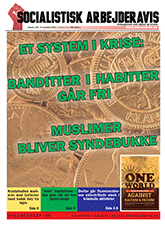Tema: borgerlige revolutioner
- borgerlige revolutioner
- Neil Davidson: Feedback: Revolutions between theory and history: a response to Alex Callinicos and Donny Gluckstein
International Socialism Journal nr. 142, apr 14 – side 177
Note: Any author who attempts to reappraise a fundamental concept in historical materialism, in this case bourgeois revolution, can at the very least expect their work to receive close scrutiny from fellow Marxists. If, more specifically, that author is prepared to express doubt about the continued relevance of the most original aspect of Leon Trotsky’s Marxism, the related concept of permanent revolution, then this scrutiny is likely to be tinged with suspicion, at least from those who trace their political lineage back to the Left Opposition and the Fourth International.
- Alex Callinicos: Feedback: Continuing the discussion
International Socialism Journal nr. 142, apr 14 – side 199
Note: The issues raised by Neil Davidson’s grand work on bourgeois revolutions are not merely of historical interest, but are of the first importance to the contemporary revolutionary left.
- Donny Gluckstein: Feedback: Comment on bourgeois revolutions
International Socialism Journal nr. 140, okt 13 – side 207
Note: In International Socialism 137 Alex Callinicos mixes deserved praise of Neil Davidson’s How Revolutionary Were the Bourgeois Revolutions? with some qualifications. While agreeing wholeheartedly with both Alex’s praise and reservations, there is perhaps something more which could be added.
- Talat Ahmed: Where did capitalism come from?
Socialist Worker nr. 2362, jul 13 – side 14
Note: Talat Ahmed looks at how the system developed the way it did in different parts of the world and argues that there was nothing special about the West other than accident
- Alex Callinicos: The dynamics of revolution
International Socialism Journal nr. 137, jan 13 – side 127
Note: A review of Neil Davidson, How Revolutionary Were the Bourgeois Revolutions? (Haymarket, 2012), £22.99
- Jamie Allinson: Revolution from above: The Meiji restoration: the threat of West drove Japan’s revolt
Socialist Worker nr. 2097, apr 08 – side 6
Note: In the third part of our series on revolution from above Jamie Allinson explains how military competition forced Japan’s rulers to reorganise society.
- Jamie Allinson: Revolution from above: How did capitalism come into being?
Socialist Worker nr. 2095, apr 08 – side 6
Note: In the first part of our new series Jamie Allinson looks at how modern states emerged across the world
- Pepijn Brandon: Bourgeois revolution: The Dutch Revolt: a social analysis
International Socialism Journal nr. 116, okt 07 – side 139
Note: The Dutch Revolt of the 16th century is probably the most neglected of the “classical” bourgeois revolutions. But this has not always been the case. In the years immediately preceding the French Revolution the Dutch Revolt even became something of a cause celebre.
- Robert Brenner + Chris Harman: Debate: The origins of capitalism
International Socialism Journal nr. 111, jun 06 – side 127
Note: This is the transcript of the discussion which took place between Chris Harman and Robert Brenner at a school in London in November 2004 organised jointly by the journals International Socialism and Historical Materialism.
- Chris Harman: The rise of capitalism
International Socialism Journal nr. 102, mar 04 – side 53
Note: Chris Harman, author of "A People's History of the World", seeks to explain why and how capitalism developed in the first place. Why did the once great feudal empires of the Middle East and Japan stagnate and fall behind? How did northern Europe leap ahead of the rest of the world? He seeks to show that there is one world history-a total story which can't be understood in fragments.
- John Rees: The socialist revolution and the democratic revolution
International Socialism Journal nr. 83, jun 99 – side 3
Note: Revolution, like war, was supposedly banished from the world scene a decade ago. In fact, social inequality and class conflict have become more marked in the last decade. But the major revolutionary challenges to the existing order in the last ten years--the revolutionary transformations in East Europe and South Africa and the still continuing Indonesian Revolution have so far resulted in the achievement of parliamentary regimes underpinned by capitalist economic structures. In 'The socialist revolution and the democratic revolution' John Rees looks back at the original democratic transformations, the classical bourgeois revolutions in England, America and France, and compares them with the upheavals of the last ten years. The comparison reveals that today more discriminating approaches are necessary in the field of strategy and organisation if workers' power is to be the outcome of contemporary revolutions.
- Sean Vernell: 1848 – arbejderklassens ilddåb
Socialistisk Revy nr. 6, aug 98 – side 24
Note: Året 1848 markerede den første ægte internationale række af revolutioner. Sean Vernell genkalder dette vendepunkt i europæisk historie, og argumenterer for, at det markerede fremkomsten af arbejderklassens styrke.
- Chris Harman: From Feudalism to Capitalism
International Socialism Journal nr. 45, dec 89 – side 35
Note: The origins of the capitalist mode of production have been hotly debated by Marxists throughout the post-war period. Chris Harman examines the debate, including the work of Maurice Dobb and Robert Brenner. He goes on to provide a new synthesis which takes adequate account of both the economic changes and the political battles that made possible the transition from feudalism to capitalism.
- Alex Callinicos: Bourgeois revolutions and historical materialism
International Socialism Journal nr. 43, jun 89 – side 113
Note: Alex Callinicos not only examines the class structure of the French Revolution, but also that of the other classical bourgeois revolution, the English Revolution of 1640. He then looks at the American Civil War and the bourgeois revolutions from above – Germany under Bismarck and the Meiji Restoration in Japan.
- Norah Carlin: Medieval Workers and the Permanent Revolution
International Socialism Journal nr. 1, jul 78 – side 43
Note: The existence of workers’ struggles in the Middle Ages is rarely recognised by Marxists. This is a pity, because interesting and often heroic struggles which ought to be part of our tradition have been suppressed. Who now has heard of the Matins of Bruges, the Ciompi, or the workers of Provins who lynched the mayor when he ordered an extension of the working day?
Der blev fundet 15 artikler
Til hovedgruppe – Til temaoversigt
- Leder: Det mener vi
- Interview: Kampen mod umenneskelige fængslinger af afviste asylansøgere nytter noget
- Udenlandske chauffører har usle vilkår i Danmark
- “Grøn” kapitalisme – kun grøn, når der kan tjenes penge
- Derfor går finansverdenens nålestribede amok i kriminelle aktiviteter
- 1968: Året der forandrede alting
- Mere end en Saudi PR-katastrofe
- To år med Trump har mobiliseret millioner til modstand
- Almindelige menneskers historie: 3. De første store stater og de første klassekampe



 Newsfeed
Newsfeed